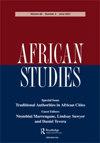Legal representation in lacuna: The Namibian Legal Resources Centre, Southern Africa Project, and the trial of the Cassinga detainees
IF 0.9
4区 社会学
Q2 AREA STUDIES
引用次数: 1
Abstract
ABSTRACT In late 1978, South African Defence Force troops raided southern Angola's Cassinga settlement. They rounded up dozens of alleged SWAPO-PLAN combatants and held some for more than a decade. The resulting legal battles put to the test lawyering skills in both southern Africa and the United States, and they undermined the apartheid state's ability to crush dissent. This article considers the lens of the Cassinga detainee crisis to assess how South African, Namibian and American lawyers utilised American case law in South African courts. It begins with a brief discussion of the history of the involved parties and continues to discuss the saga and its outcomes. Both the South African state and its opposition viewed Cassinga's battles as central to exercising power in Namibia, and this demonstrates the centrality of the law and legal mechanisms to dismantling apartheid. It highlights the degree to which the law proved a useful tool for liberation movements to ensure the continuation of political dissent within South Africa, withstanding public repression of the 1980s. Ultimately, it regards the Cassinga case as representative of many that kept open dialogue between the South African state, liberation movements and the international community.空白中的法律代表:纳米比亚法律资源中心、南部非洲项目和对卡辛加被拘留者的审判
1978年末,南非国防军突袭了安哥拉南部的卡辛加定居点。他们围捕了数十名据称是SWAPO-PLAN的战斗人员,其中一些人被关押了十多年。由此产生的法律纠纷考验了南非和美国的律师技能,也削弱了这个种族隔离国家镇压异见的能力。本文以卡辛加被拘留者危机为视角,评估南非、纳米比亚和美国律师如何在南非法院运用美国判例法。它首先简要讨论了有关各方的历史,然后继续讨论这个传奇及其结果。南非政府及其反对派都将卡辛加之战视为在纳米比亚行使权力的核心,这证明了法律和法律机制在废除种族隔离方面的核心地位。它突出表明,法律在多大程度上证明是解放运动的有用工具,以确保南非境内的政治异议继续存在,尽管1980年代受到公开镇压。最后,它认为卡辛加案代表了南非国家、解放运动和国际社会之间保持公开对话的许多人。
本文章由计算机程序翻译,如有差异,请以英文原文为准。
求助全文
约1分钟内获得全文
求助全文

 求助内容:
求助内容: 应助结果提醒方式:
应助结果提醒方式:


